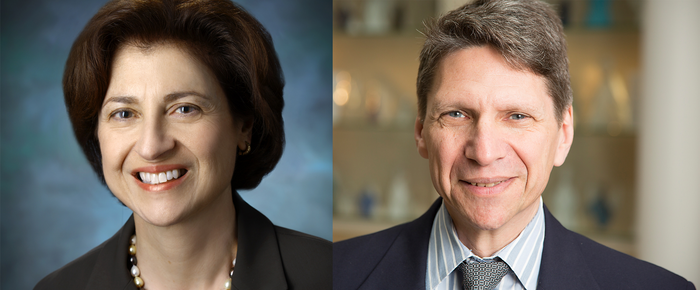Drew Pardoll, M.D., Ph.D., and Suzanne Topalian, M.D., leading cancer immunotherapy investigators in the Johns Hopkins Bloomberg~Kimmel Institute for Cancer Immunotherapy and Kimmel Cancer Center, have been named by the Society for Immunotherapy of Cancer (SITC) as Fellows of the Academy of Immuno-Oncology. They are among 12 leading specialists in the field who will be inducted in November during SITC’s 37th Annual Meeting in Boston.

Credit: The Johns Hopkins Kimmel Cancer Center
Drew Pardoll, M.D., Ph.D., and Suzanne Topalian, M.D., leading cancer immunotherapy investigators in the Johns Hopkins Bloomberg~Kimmel Institute for Cancer Immunotherapy and Kimmel Cancer Center, have been named by the Society for Immunotherapy of Cancer (SITC) as Fellows of the Academy of Immuno-Oncology. They are among 12 leading specialists in the field who will be inducted in November during SITC’s 37th Annual Meeting in Boston.
The Academy of Immuno-Oncology was established by SITC to honor individuals who have helped launch the field of cancer immunotherapy into the breakthrough cancer treatment it is today.
Pardoll, the Abeloff Professor of Oncology, and professor of medicine, pathology and molecular biology and genetics at the Johns Hopkins University School of Medicine, is director of the Bloomberg~Kimmel Institute for Cancer Immunotherapy and co-director of the Cancer Immunology Program at the Johns Hopkins Kimmel Cancer Center.
He has made several advances in cellular immunology, including the discovery of gamma-delta T cells, involved in the initiation and continuation of an immune response, natural killer T cells, known as NKT cells, which amplify or dampen immune responses, and interferon-producing killer dendritic cells, a more recently discovered immune cell which helps govern natural immunity and adaptive responses to cancer. Pardoll has spent more than three decades studying molecular aspects of dendritic cell biology and immune regulation, particularly related to mechanisms by which cancer cells evade elimination by the immune system.
Pardoll is an inventor of several immunotherapies, including GVAX cancer vaccines, which supercharge the immune system to destroy cancer cells, and Listeria monocytogenes-based cancer vaccines, which use the listeria bacteria to generate an immune response against cancer cells. He discovered the programmed cell death 1 ligand 2 (PD-L2) inhibitory molecule, which cancers cells can exploit to shut down an immune response, and leads the Johns Hopkins cancer immunology program that developed PD-1 pathway-targeted antibodies, demonstrating their clinical activity in multiple cancer types. He also defined another immune checkpoint, LAG3, and showed that combination antibody blockade of LAG3 and PD-1 provided synergistic anti-tumor activity. This work led to the FDA approval of a LAG3/PD-1 antibody combination as initial treatment for melanoma.
“I have worked 34 years in the cancer immunology field, the first 20 amidst high skepticism about whether immunotherapy would ever succeed. I view my induction as recognition by my peers of that commitment and persistence and never taking no for an answer,” says Pardoll.
Topalian, the Bloomberg-Kimmel Professor of Cancer Immunotherapy and professor of surgery and oncology, is associate director of the Bloomberg~Kimmel Institute for Cancer Immunotherapy and director of the Johns Hopkins Melanoma/Skin Cancer Program.
She is widely recognized for her research manipulating immune checkpoints in cancer therapy, including PD-1 and its major ligand, PD-L1. These natural immune checkpoints are exploited by cancer cells to shut down the anti-tumor immune response. A decade ago, Topalian led a team at Johns Hopkins in a global effort that established immunotherapy as the fourth pillar of cancer treatment, alongside surgery, radiation therapy, and chemotherapy. After the research was published in the New England Journal of Medicine, it gained global attention and prompted several drug companies to devise agents that block PD-1/PD-L1, the focus of many clinical trials that ultimately led to FDA approvals in 20 different cancer types, making them the world’s most prescribed cancer treatment.
Topalian’s basic studies of human anti-tumor immunity have provided a framework for developing other kinds of cancer immunotherapies, including cancer vaccines and adoptive T cell transfer, in which immune cells are activated and expanded in the laboratory and infused back into the patient. Her current work focuses on discovering biomarkers predicting response and resistance to anti-PD-1 therapy and developing new strategies such as neoadjuvant (pre-surgical) anti-PD-1 administration and effective treatment combinations.
“It’s a special honor to be recognized by peers who know first-hand the difficult times our field has been through, and the dark days when skepticism against cancer immunotherapy almost won out,” says Topalian. “For many years, we were regarded as a ‘fringe group’ in oncology. Now we’re mainstream and still gaining momentum.”




